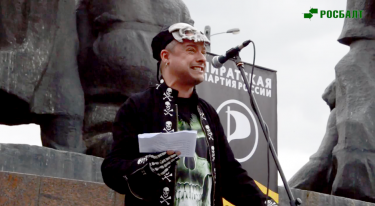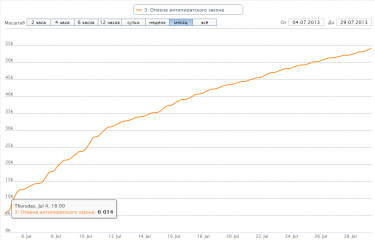Russian supporters of internet freedom have their work cut out for them if they want to move their cause from the virtual to the physical world — last Sunday's protests against the so-called “anti-piracy law” attracted only a few hundred people out of the thousands that have voiced their opposition online.
RuNet Echo has previously written on the increasing encroachment on internet freedoms in Russia, and on what some would call creeping censorship. Last month, this trend seemed to have come to a head, with the Russian parliament passing a law that is essentially equivalent to USA's SOPA [GV]. The law, which is due to come into effect on August 1, 2013, will allow any website to be shut down simply on the basis of claims that it hosts or links to copyrighted material.
The Russian Internet industry [ru] responded with shut-downs [GV], threats of an internet wide strike on August 1, petitions, and a series of protests, which were set to take place on July 28. As the protest announcement read [ru]:
Как показывает практика, власти в России редко обращают внимание на бурление в Сети. Гораздо больше их волнуют реальные люди, выходящие на улицы.
As practice shows, the Russian government rarely notices the churning of the Web. They are much more concerned with real people who walk out on the streets.
While this is a dubious proposition (considering the massive “successes” of Russian street protests over the last year), street actions were planned several weeks in advance with the support of the Russian Pirate Party [ru], RosComFreedom [ru], and the Association of Internet Users [ru], and took place in regional cities like Kazan, Tomsk and Novosibirsk [ru] in addition to Moscow and St. Petersburg. Nevertheless, they failed to bring out the crowds. The Moscow protest/concert, for example, attracted only “300-500″ people [ru], said the Pirate Party's Peter Rassudov — which is only half of the protest's VKontakte page [ru] 1,105 members.

A man dressed in skulls and symbolizing the “Death” of the RuNet leads a rally in Moscow. YouTube screenshot.
Unsurprisingly, the proponents of internet freedom have had better success in their online endeavors, specifically with the petition they've filed on the Russian Public Initiative [ru] website. The petition [ru], which seeks the repeal of the the law deemed unfair, has so far been signed by 54,000 people, and reads:
Мы считаем, что данный закон направлен не столько против распространения нелегального контента, сколько против развития Интернета в России, нацелен на его разрушение, а также ущемляет интересы национальной интернет-индустрии и права интернет-общественности.
We believe that this law is aimed not so much against distribution of illegal content, but against development of the Russian Internet, is aimed at its [the Internet's] destruction, and additionally, infringes on the interests of the national internet-industry and the rights of the internet-using public.
While the number of signatures in less than a month is quite a feat, it falls short of the 100,000 needed for the petition to be reviewed, and shows signs of flagging:

A graph showing total votes for the petition seeking to repeal the “anti-piracy” law. Screenshot, July 29, 2013.
Russian techies don't give up easily, figuring out all kinds of ways to get out the vote — like a banner that any participating website can put at the top of their page (designed and posted [ru] by an anonymous user to the tech website Habrahabr). Perhaps the coming August 1 “Internet Strike” (a shutdown of participating websites) will also jar more internet users into voting. However, even if the petition reaches 100,000 votes, unless these thousands of virtual supporters can be converted into physical bodies on the streets and lobbyists in Parliament, the Russian government isn't likely to care.









5 comments